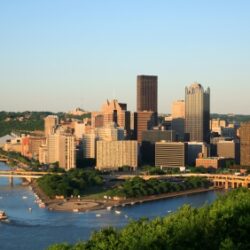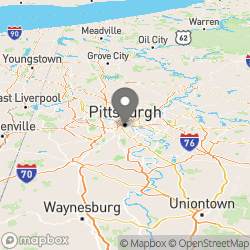Pittsburgh, Pennsylvania


What It Is Like to Retire in Pittsburgh
Pittsburgh, Pennsylvania consistently makes the “Best Places to Live” lists. It has a beautiful setting where two major rivers (the Allegheny and the Monongahela) combine to form the Ohio River against a backdrop of steep hills. Pittsburgh has a solid economy, low cost of living, and growing educational, cultural and medical infrastructures. Pittsburgh has been named as a top 10 Value City for Retirement, and was also once the focus of a series on the "PBS Newshour". The New York Times offered it as an example of resilience even in the 2009 economic collapse. Nicknamed the “Steel City”, that industry's collapse led to a hi-tech and medical resurgence in the city’s economy. The University of Pittsburgh, Duquesne, Carnegie-Mellon, Chatham College, and Washington & Jefferson College are just some of the prestigious schools in the area. The student presence has a major impact on the city's ambiance, culture and economy. Although Pittsburgh is Pennsylvania’s second largest city (300,000), it has a relaxed feeling. There are distinct districts here including a compact downtown area near the Point (where the rivers combine) with many skyscrapers.

Where to Retire in Pittsburgh and Home Prices
The North Side is residential and has many architecturally interesting homes, along with many of the city’s popular attractions. The East End is home to the city’s universities and colleges and combines a noticeable student presence with homes for the very wealthy (in Shadyside and Squirrel Hill). The West End’s Mt. Washington features the Incline, a ride that showcases a great view of the city. Homes in that area also provide stunning views. There are a number of ethnic neighborhoods, including the famous Hill District (African American). There are many lovingly restored homes in neighborhoods. According to the National Association of Realtors, the median home value in Pittsburgh was $ 225,900 in the second quarter of 2023.
What Is Special about Pittsburgh
Relaxed living in a culturally rich environment: consistently rated as a top livable city, world famous sports teams, Duquesne Incline, Monongahela Incline, Fort Duquesne, Fort Pitt, Cathedral of Learning, Mattress Factory (museum of contemporary installation art), Pittsburgh Zoo & PPG Aquarium, Point State Park, The South Side, The Waterfront, The Strip District. Pittsburgh is rated above average for walkability and for biking.
What Is Not Special about Pittsburgh
Pittsburgh winters are cold and dreary, although the region does not receive much snowfall. Here are some helpful facts about what it is like to retire in Pennsylvania.
Who Will Like Retirement in Pittsburgh
Pittsburgh attracts a community of retirees who want to live in a livable city with many colleges and cultural opportunities. Pittsburgh has a proud past and people are strongly affiliated with the city.
Local Economy Is Driven by
The largest employer is the University of Pittsburgh and its Medical Center. There are a dozen or more Fortune 1000 companies with headquarters here including H.J. Heinz, PNC Financial, PPG Industries, and Dick’s Sporting Goods. Technology, retail, finance, education, and medicine dominate the economy.
Climate and Physical Environment
The city is in the southwest corner of Pennsylvania. It is located at the confluence of the Allegheny River and Monongahela River, where they form the Ohio River. The area between the rivers is called the Golden Triangle. The terrain is extremely hilly. The July average high temp is 85 and the January average low is 20. May is the rainiest month.
Restaurants & Cultural Scene
The wealth created by Pittsburgh's industrial past has resulted in an unusually strong cultural life. Major institutions include the Pittsburgh Symphony Orchestra (in Heinz Hall), the Pittsburgh Opera, the Pittsburgh Dance Council and the Pittsburgh Ballet Theater. The River City Brass Band and the Pittsburgh Youth Symphony Orchestra perform here. Pittsburgh has a long tradition of jazz, blues and bluegrass music. Museums include the Andy Warhol Museum, ArtGardens of Pittsburgh, the Carnegie Museum of Art, the Frick Art & Historical Center, Carnegie Museum of Natural History.
Crime
The crime rate is above the national average.
Medical facilities
There are more than a dozen hospitals here, many of which are world famous.
Transportation
Pittsburgh International Airport,. the mass transit system, the 11th largest in the nation, is excellent with buses, light rail, and funiculars (Inclines). Amtrak offers intercity rail service. There are bike trails along the riverfronts. Pittsburgh is above average in walkability when compared to other cities.

Comments on "Pittsburgh"